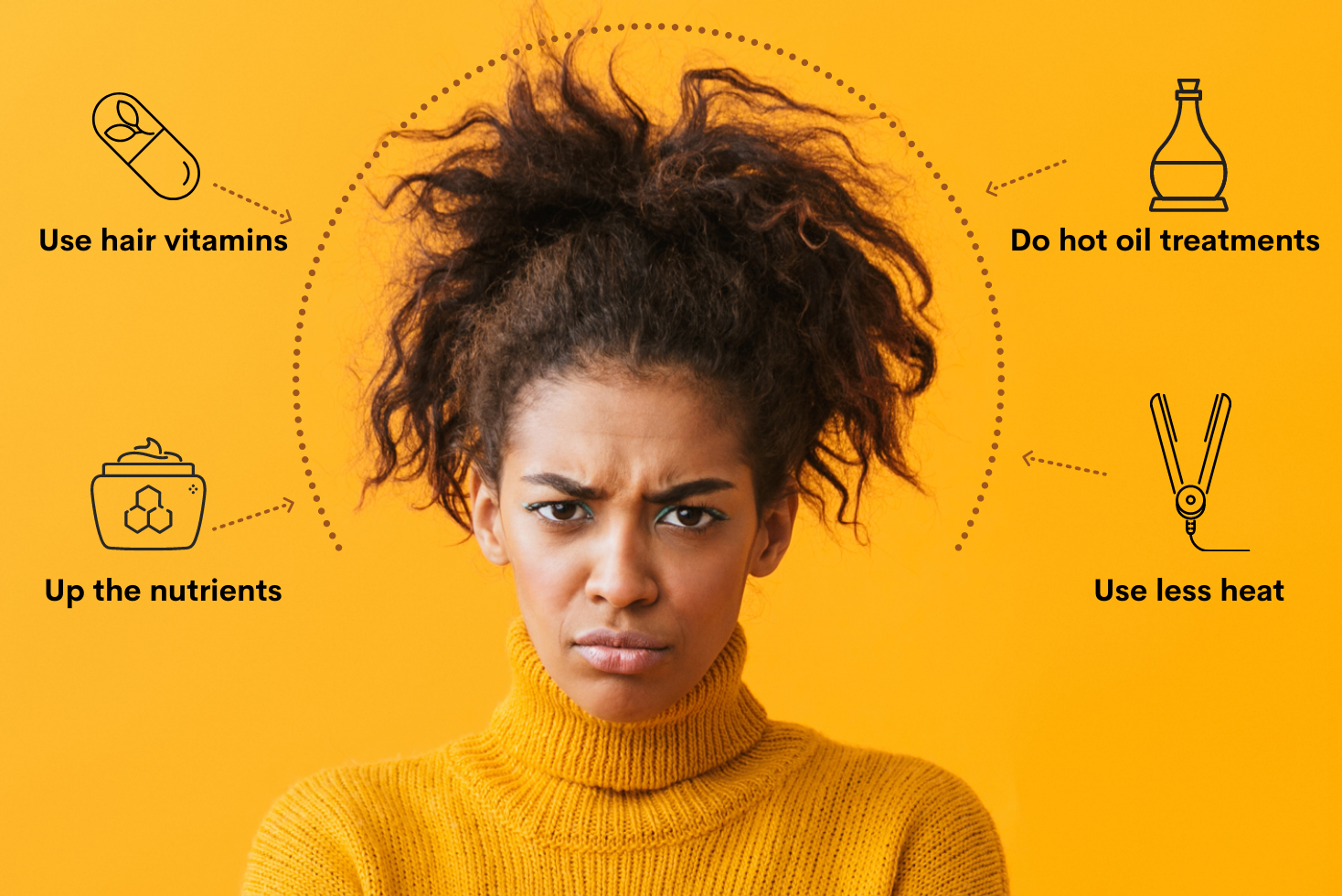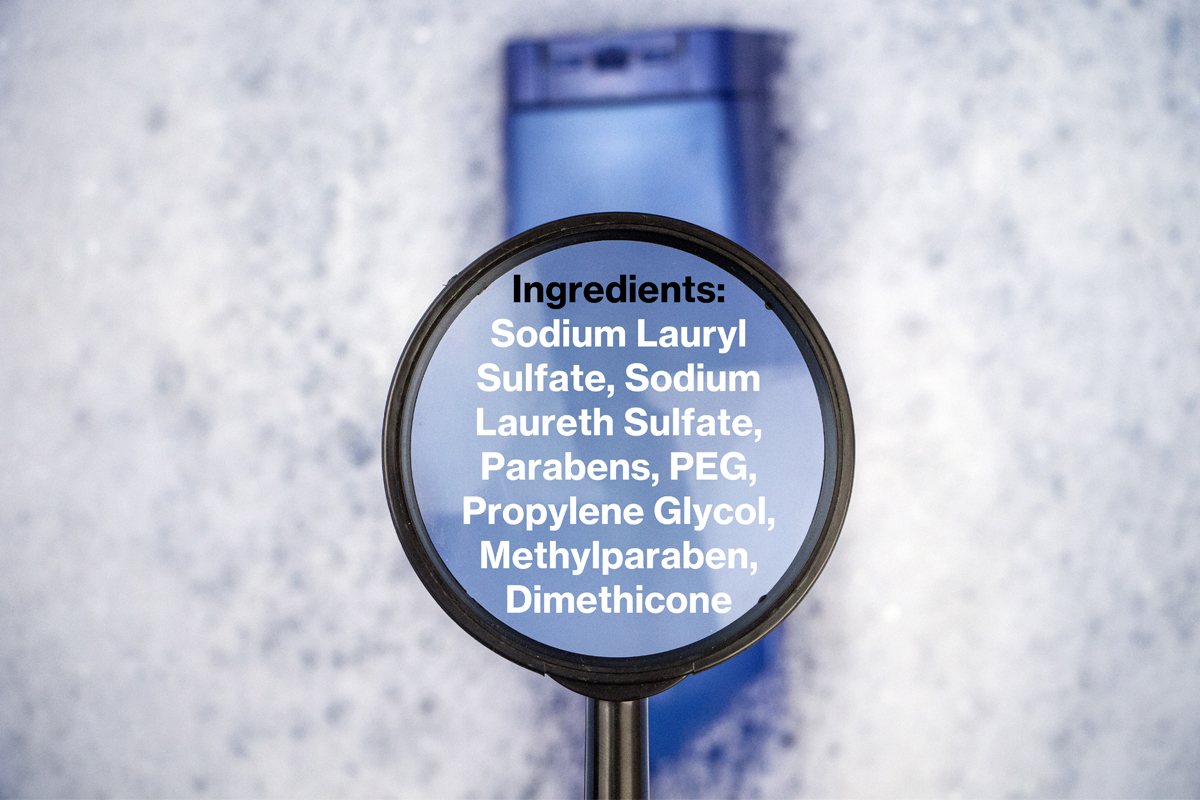How to Treat Damaged African American Hair at Home – Follow These Tips
Updated on
This post may contain affiliate links. As an Amazon Associate, we may earn from qualifying purchases.

Avoiding damage on any hair type is no small feat.
For those who inherited textured hair, it’s a seemingly impossible task. Damage can happen via different forms such as:
- A change in climate
- Sneaky ingredients in your products
- Incorrect styling techniques
- Too much heat
- Chemical treatments like relaxing
… just to name a few.
Damage in some way or shape is something that most people with textured hair experience at least once, and those individuals with kinks or coils should always know at least the basics for how to treat damaged African American hair at home.
The following tips are some of the most straightforward steps that you can regularly incorporate into your hair care regimen to prevent any breakage or damage in advance and help repair and treat damaged natural hair.
Table of Contents
1. Use Hair Products That Are Nutrients-Rich
One of the best ways to heal damaged hair is to restore lost nutrients.
This may seem like an obvious tip, but many individuals do not provide the damaged areas with enough nutrients, protein, and moisture.
Luckily, there are numerous ways you can repair the damage using at-home remedies.
2. Deep Condition Your Hair
Deep conditioning your hair once a week, for example, is a moisturizing hair care treatment that will give you healthy ingredients that your hair needs for restoration.
Finding a quality deep conditioner (while looking out for harmful ingredients) will not only repair your hair but will promote it to grow as well.
Finding deep conditioners that have repairing oils or moisturizing ingredients similar to it is very important because if there is one thing worse than damaged hair, it’s damaged hair that’s dried out more than it should be.
Along those same lines, finding a simple protein treatment will allow you to see remarkable improvements. Protein treatments replenish each strand and build up the cuticle layer, improving your natural hair’s strength.
Damaged hair tends to have holes and cracks on the cuticles. A protein treatment helps fill those holes and create a barricade around the hair shaft to help prevent future damage.
Here’s the best product for damaged African American hair that most hairstylists recommend using at home for best results:
Aphogee 2-Step Protein Treatment
3. Take Vitamins Like Hair Gummies
Hair gummies are jam-packed with vitamins and other essential ingredients that can heal your hair from the inside.
Designed for people who have a hectic lifestyle, gummies are easy alternatives to spending hours tending to your hair.
Check out the best hair gummies we recommend.4. Try Hot Oil Treatments
Another excellent treatment is a hot oil mask, and there are many you can make using the oils you have in your pantry, such as olive oil and coconut oil.
As well as repairing, they can promote your hair to grow by helping to strengthen and restore.
Hot oils are super beneficial for dry hair as they infuse moisture deep into the hair shaft.
Other added benefits are:
- Stops your scalp from flaking
- It helps to relieve dandruff
- Improves elasticity
- Encourages fuller hair growth
Recommended product:
OKAY Black Jamaican Hot Oil Treatment
5. Get Regular Trims
Trust me; I know the anxiety associated with going in for a “trim” with curly hair.
A trim usually turns into an inch, which turns into about 8 inches of shrinkage!

All of my hair-cutting experiences usually ended with me in tears, wishing I had never given anyone the OK to cut my hair.
It can be so difficult to cut even the smallest amount off when you have natural hair because you understand how long it takes to see any type of growth. After having horrible experiences whenever I handed someone else the scissors/the fate of my future, I decided to begin doing simple cuts at home by myself.
Let me emphasize “simple” because I do not recommend doing a complicated haircut at home with rusty kitchen scissors.
Hair breakage commonly occurs on the ends of hair (also known as split ends), which are usually very brittle and dry.
If you ignore those split ends, you will struggle to minimize your hair strands from breaking even further. By no means am I suggesting that you should get inches upon inches chopped off unless you want to, but I do recommend getting a regular (regular meaning every few months) cut to get rid of the damage on the ends of your hair.
I highly recommend the DevaCurl haircut if you have one of their salons near you. These guys are experts and know how to trim damaged afros so that your hair grows out nicely.
6. Take Extra Precautions When Styling
Arguably the most critical time to give extra effort and care to your hair is when styling it. Wet hair is extraordinarily delicate, so when you go to detangle your natural hair, be sure only to do so when you have conditioner in. To go along with that, simply use combs specifically made to detangle and always detangle from ends to roots.
After you wash, use helpful, not harmful, products that do not include damaging chemicals. I highly suggest incorporating an essential oil or two into your hair care regimen; this will act as a hydrating treatment and help you avoid dry hair.
It goes without saying, but I want to make sure to cover all of my bases here. When I say never, I mean never EVER use heat on damaged hair.
You should avoid using heat on all hair types regardless if it has damage or not, but especially never use it on damaged hair.
Heat will do nothing for you except stunt hair growth, give you split/even more dry ends, and will keep your hair in a compromised state. All of those things will stray you further and further from the goal, and the goal is to have the best health for your natural hair.
Heat damage is never fun, and it can be a very stressful thing to deal with.
Related: How to recover curly natural hair from heat damage.
The most important part of helping treat damaged African American hair is knowing the right ways to do it. It’s essential to incorporate moisturizing treatments into your hair care routine, along with finding the right shampoo and conditioner.
Avoid using heat. Avoid products with harmful chemicals because using those harsh chemicals on your hair regularly will slow down the improvements.
Homemade masks are very conditioning and nourishing and are great for improving your hair’s health. Using those for deep conditioning will ensure a proper amount of hydration for your hair.
7. Be Aware Of What’s In Your Products
A commonly overlooked step that makes the most significant difference is: checking the ingredients in your products.

As you progress into your natural hair journey, whether you are recovering from damage or just looking to achieve healthy hair, the products you apply can make or break your hair.
If somebody aims to live a healthier lifestyle, they hear left and right that it all starts in the kitchen with what they eat. The same idea goes for healthy hair. If you are supplying your kinks or coils with beneficial and nutrient-rich ingredients, you’ll see a vast improvement as opposed to exposing your hair to harmful ingredients that often promote dry and damaged hair.
Here’s a list of the most harmful ingredients that are sadly commonly found in many African American hair products:
Sulfates
Sulfates are a key component in most shampoos, and they are among the most harmful ingredients for natural hair. They tend to strip the hair of natural oils, and since curly hair dries out extremely fast, you could eventually experience breakage, as well as dry and brittle ends.
Parabens
Parabens can strip hair color, rob your hair of protein, and make your curls dry and frizzy.
Used as preservatives in cosmetic products, they may also disrupt hormonal functions by mimicking estrogen.
Silicones
Silicones are added to products to give your hair a smooth and silky softness, but in reality, the “smoothness” is simply build up on each strand that weighs down your hair. It’s essential to understand your hair products’ ingredients. Even your favorite natural hair shampoo may contain ingredients notorious for hair breakage, therefore lessening the chances of getting and keeping your hair healthy.
Final Thoughts
Renew, recover, and re-energize your ailing hair with these easy-to-do home treatments.
To summarise:
- Replenish the lost nutrients (protein treatments)
- Do hot oil treatments
- Take hair vitamins
- Do regular haircuts
- Be gentle when styling
Aphogee Protein Treatment for Black Hair
About the Author
 Jane Schlosser
Jane SchlosserJane is a freelance writer who occasionally writes for us.

